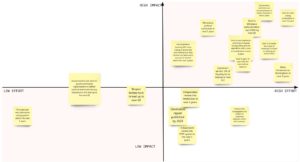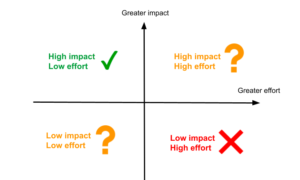
By Suraiya Rahman
Last month we walked you through the initial stages of an advocacy campaign focusing on how to strengthen democracy in the U.K. This is a challenging and contested area and we definitely don’t claim to have all the answers. In the last blog post, we began by identifying the problems, proposing solutions and then transformed these solutions into SMART Asks. This week, we’ll be focusing on how to decide and prioritise which SMART Ask you should invest your time, efforts and resources into in order to achieve the maximum impact in your campaign.
In advocacy work, it’s really important to focus efforts on achievable goals. For example, if you work with your partners in the field and you all put our effort into achieving one specific objective, then you are much more likely to succeed than if you try to focus on several different things at once and your partners do too. Successful campaigns can start by focusing on quite a small ask and use that to build momentum to next time advocate for a bigger, more substantial ask. Likewise, if you are a relatively small organisation, it’s important to consider the best way to harness and strategically apply your skills to realise your goal.
This neatly brings us to the next step of developing an advocacy campaign: an impact vs effort analysis. It’s pretty self explanatory but it involves mapping out the SMART Asks that you drew up earlier based on the effort it would require (i.e how winnable is this ask?) along with the impact it could possibly achieve (i.e what difference will it make if we win this ask?).
Below is our impact vs effort chart based on our earlier SMART Asks on strengthening democracy.

As you’ll notice, most of the SMART Asks are concentrated in the top-right quadrant. These SMART Asks generally tend to be legislative changes or requests for the government to enact. Ideally, your campaign would focus on an SMART Ask that requires less effort but will still translate into a high achieving impact.
Essentially:

A few of these asks to do with banning second jobs and party funding are pretty timely considering recent events. So, we actually felt that it would require less effort to campaign on these SMART Asks because of the current conversations and momentum building around these issues. This is actually a great tip to consider when mapping out your SMART Asks – pay attention to current conversations that you can tap into to enhance the legitimacy and relevance of your campaign ask.
Whilst some of these SMART Asks may be less realistic or feasible (like moving Parliament to Birmingham in the next 5 years!), the act of brainstorming and then filtering out less realistic, and therefore less impactful, campaign asks is very much part of the process and is still a useful practice to think purposefully about potential solutions to strengthen democracy in the U.K.
So far in our series, we’ve gone from identifying a problem, to coming up with solutions, to transforming these into SMART Asks and finally we’ve mapped out these campaign asks based on their impact and effort. The next step? Mapping key stakeholders! Keep your eyes peeled for the next instalment of our advocacy series coming to your screens soon.
The topic of strengthening democracy is a complicated and sometimes controversial one. Get in touch with us here if you have any ideas on which high impact/low effort SMART ASK we should focus our campaign on, if you think we’ve missed something key, if you disagree with our analysis, or if you have any other comments. We’d love to hear from you!